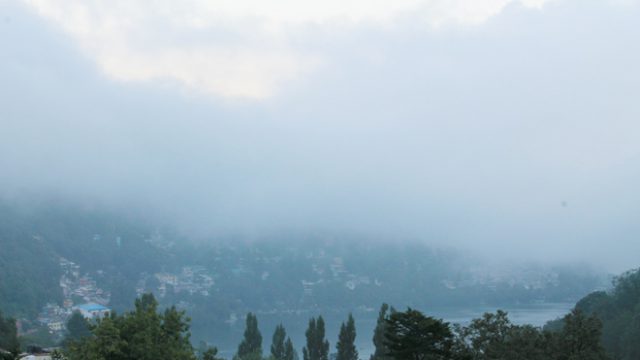Now I see you, now I don’t—this was how I felt about Nainital’s huge lake, in mid-August, when the hill station was an ever-shifting haze of mist, light drizzle, heavy downpour and chilly breeze. Before I get into the how, when and what of my trip to Nainital, I feel the need to add that the hill station is highly underrated. Yes, everyone knows about the little town and everyone’s been there but let’s not forget that the town started life as a favourite getaway for the British. There must have been something very charming about this place, and despite best efforts to ‘develop’ it, that charm remains. There’s the lake, of course, with a footpath running round it, lined with maple trees. It must be exceedingly pretty in the fall months. With just the right amount of chill in the air and the ever-present mist, Nainital was beautiful.

I was in Nainital for the Namah Nainital Mountain Monsoon Marathon—an annual event that takes place on every last Sunday of August. This year, the event was sponsored by Namah, a premium luxury brand of DS Hospitality and my host was The Manu Maharani hotel. Built in 1991, the property’s now managed by DS Hospitality, and it’s certainly one of the finest resorts in the Kumaon region. The hotel’s a well known landmark in Nainital and lies a short distance from the Mall Road, right in the heart of town. It boasts of a gorgeous view of the lake from the hotel’s lawn. The rooms are pretty and comfortable, but when you are in a hill resort with the view of a foggy lake, giant oaks and a pretty garden, you can’t help but grab a book and go sit under those huge trees and feel the stress of city life slowly leaving your body. When I was not busy making way for the thousand or so marathon runners, looking at the old bungalows and marveling at the green and yellow of maple leaves, I read my book under the giant oaks!
On my second day, our planned visit to the Pangot Bird Sanctuary failed miserably. Reasons being, a) we didn’t start early enough, b) halfway to the bird sanctuary it started to pour. On our way back to the hotel, I come across some less-than-impressive specimens of our very own homo sapiens. The Himalayan View Point, just outside Nainital, is a beautiful spot from where you can get a picturesque view of the mighty Himalayan ranges and the green ridge below. A group of tourists had turned the spot into their personal entertainment zone. They occupied almost half the road, shouted boisterously, and threw empty bottles everywhere. It’s sad to see such beautiful places deteriorating due to careless tourism. No wonder Nainital only evokes jaded ennui from travellers. It shouldn’t be so. The hills, the treks, the mountains, it’s all there. In fact, Nainital has some beautiful stretches of winding roads perfect for mountain biking. Of the quaint little hill station of the British, all that remains of its glorious past are the old school and college buildings from early 20th century. Other than that, Nainital is often sidelined as a destination that’s been done to death.

Thanks to the failed bird-watching expedition, I now had the afternoon free so I headed towards the lake. Although the weather was still very foggy, I toyed with the idea of a boat ride. On a short stretch between the Tibetan Market and the lake, I came across small groups of boys playing football, without a care for the occasional light drizzle. The rain stopped quite abruptly as I reached the lake and the breeze lifted much of the fog that covered the lake. The resultant change in scenery was pretty dramatic. I could now see the lake clearly, with a light mist hovering on it, a playground in the distance and houses rising up the distant hillside, still shrouded in mist. In barely a few minutes, it was a perfect day for boating!
I hired a four-seater row boat for Rs 200 and set off on a tour of the lake. Never liked boating, but then I was in the lake district of Uttarakhand. Quite a large amount of waste had accumulated by the dock, but the boatman assured me that this was due to the downpour. Otherwise, he said, the lake is cleaned daily. This information put me in an awkward state of mind where I wanted to feel happy for the lake but felt sorry at the same time that just a heavy downpour can clog a lake of this size with the town’s waste.
At the end of the customary chukkar, the boatman took us near a large school of fish. A favourite tourist pastime is to feed bread to the large number of fish that live in Nainital. The fish were swarming to get at the bread crumbs. They were so close to the surface that I could hear them flap their fins! Some of the fish were quite scarily large, but it was quite an experience!
I remember my first visit to this region in 2005. It was a very cold July, and I remember drinking from a tiny rivulet that trickled down the hill by the side of the road. I still remember the sweetness of that delicious mountain water. I also remember thick vegetation everywhere. 11 years later, I couldn’t help but wish for the hill station to go back to the old pristine days.




